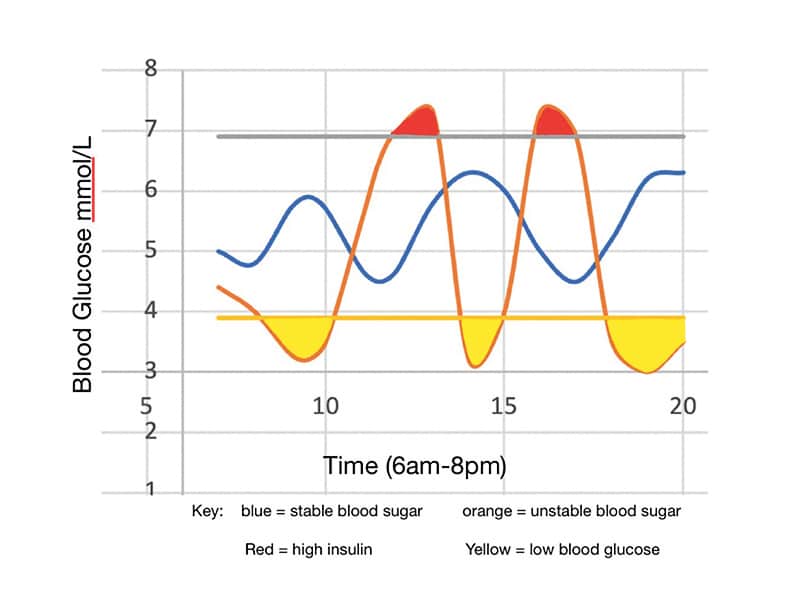
Eoin Roe has a chiropractic clinic in Skibbereen. He is also a certified functional medicine practitioner and provides help with chronic health conditions.
Call 087 9582362
www.roehealth.ie
Mental health issues are often treated as health conditions that are separate from other health problems. But in truth there are underlying physiological mechanisms that play a role in the development of mood disorders such as depression or anxiety.
Our brain relies on neurons to govern our thoughts, actions and how we feel. The brain is an energy-hungry organ, making up only two per cent of body weight but requiring 20 per cent of your daily energy demands. Your brain loves two things above all others 1) a steady supply of blood glucose and 2) a steady supply of oxygen.
Please be aware that blood glucose is different from glucose (sugar) that you eat. All food that we eat whether protein, fat or carb will eventually convert into glucose or ketones, which our body then uses as fuel.
Traditionally blood glucose is measured in a fasting blood test with normal ranges between 3.9 – 6.9 mmol/L. The upper range from 5.7 – 6.9 mmol/L is a flag for pre-diabetes and provides an opportunity to manage or prevent diabetes from developing. However little attention is given to the lower end of the scale and low blood glucose levels.
If your blood glucose drops below 3.9 mmol/L you are likely to be feeling quite unwell, probably fainting, maybe have some dizziness and spells of disorientation and lacking in energy. Blood sugar levels that get too low can be dangerous and need medical attention.
Blood glucose levels naturally fluctuate throughout the day but there are complex mechanisms that help to keep the glucose level within a functional range that works well for your body. When you don’t eat enough, skip meals, eat a diet that has too much sugar and carbohydrate (this includes fruit) the fluctuations in your blood glucose levels can become exaggerated causing you to spend times of the day when your blood sugar is too low or too high and this has effects on how well your brain can function. (See table)

There are a number of physiological mechanisms that affect your brain function and mood, two of which are firstly the GABA shunt and secondly Large Neutral Amino Acid (LNAA) transporters.
GABA Shunt
There are two types of neurotransmitters, inhibitory and excitatory. These have complex actions but if we keep it simple, inhibitory pathways and transmitters dampen or stop things from happening. GABA is the main inhibitory neurotransmitter, and plays a role in the inhibition of neural circuits and reduces feelings of anxiety.
This is important in relation to blood sugar stability because the production of GABA is reliant on the citric acid cycle. Therefore the less stable your blood sugar is the less GABA you can produce and the less the dampening effect of this neurotransmitter on your anxiety pathways.
GABA is not the only neurotransmitter, there are others and all of them require adequate amounts of amino acids in order to have enough of them. We get amino acids from eating protein in our diets, which is broken down in the gut and then distributed through the body. Some amino acids cannot cross the BBB (Blood brain barrier) on their own – they need to be carried over by other proteins and this is where LNAA transporters come in.
LNAA transporters
LNAA’s pick up the amino acid and transport it across the BBB so it is available in the brain to be converted into neurotransmitters.
Blood sugar is important for this because the balance between amino acid and insulin governs how well this can happen. When your blood sugar goes up, your insulin levels go up. When insulin goes up it inhibits LNAA’s ability to transport amino acid across the blood brain barrier.
There are a number of reasons why someone may suffer with low blood sugar but it is particularly common for people who skip meals especially breakfast.
It is not necessary to have a blood test to know if you are having problems with low blood sugar. If you suffer from the following common symptoms, it is likely your blood sugar is low and you will have fluctuating blood glucose levels depicted in the graph above: Waking in the middle of the night; Skipping meals and relying on coffee and sweets to keep going; Feeling energised after meals; Brain fog; Snacking on fruit and sweet foods; Irritable if meals are missed (hangry).
If you are regularly suffering from these symptoms then it is likely that your blood glucose level is functionally too low. If you also suffer with anxiety or depression, it is worth stabilising blood sugar, as this will have a positive effect on your mood.
The easiest way to stabilise blood glucose is by eating regularly. Most importantly start with eating breakfast within one hour of waking, you may even need to eat every three hours and switch to foods that have more fibre, protein and good fats in them.
Eoin Roe is a Chiropractor and Certified Functional Medicine Practitioner based at Roe Health in Skibbereen. If you would like to get in touch or learn more, please look at our website www.roehealth.ie or leave a message on 028 62081.


